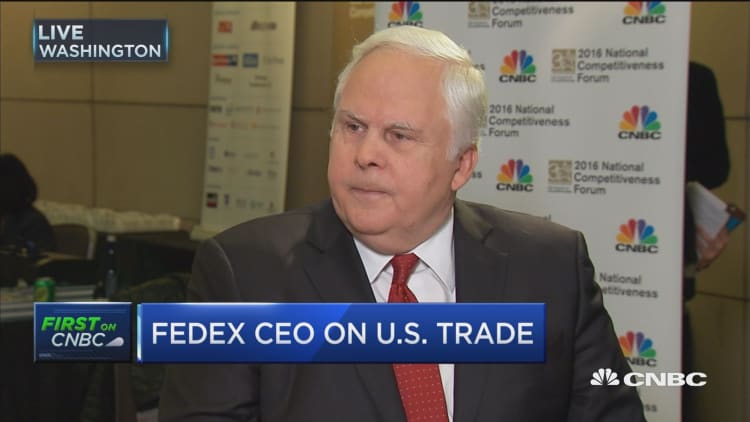
If the corporate tax rate is slashed at the same time as repatriation measures are put in place, investment in the United States will surge, FedEx founder, chairman and CEO Fred Smith told CNBC on Friday.
President-elect Donald Trump has proposed cutting corporate taxes and repatriating capital to the United States as ways of boosting the U.S. economy, and analysts are wondering how companies will use the repatriated money.
"The thing that's missing in that conversation is the U.S. corporate tax rate," Smith told CNBC's "Squawk on the Street."
"You lower the corporate tax rate, the returns on capital investment become better. You'll see more investment in the United States with the repatriation. But you can't do one without the other," the CEO said, speaking from the National Competitiveness Forum in Washington.
Smith's theory was in line with Trump's: that if corporations see lower taxes and the United States moves to a more territorial system, there will be more capital investment in the economy.
But to repatriate effectively and move to a territorial system without harming the United States' global ties, the president-elect must work to improve trade discrepancies, the global delivery service CEO said.
"About 28 percent of our economy today is trade ... the problem is we have allowed ourselves to be outmaneuvered with some other countries using mercantilist policies," Smith said, citing the economic theory that powerful countries should export more than they import.
"There's no question about the fact that a lot of countries, over the years, have tried to pursue mercantilist policies, including unilateral currency devaluations, to promote their exports to the United States while cutting off our exports to them," Smith said.
The CEO insisted that Trump was not against trade agreements as a whole, just the ones that give other nations unfair advantages. He said the president-elect, whom he called a "master negotiator," would work to establish a level trade system worldwide.
"I think trade agreements in general are good, whether they are multilateral or bilateral. The point is you need to move in the right direction," Smith said.


